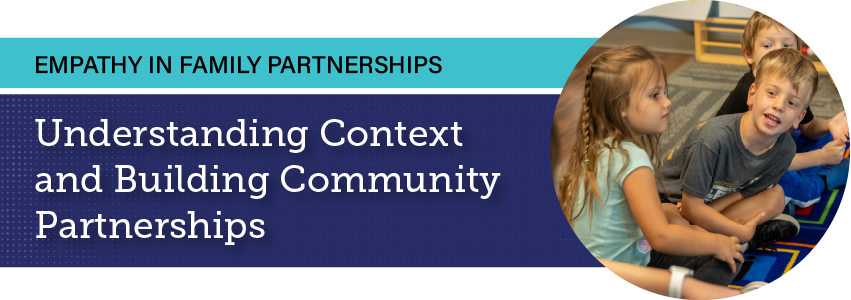CDE will be closed on Monday, September 1, for the Labor Day holiday.
You are here
Module 2: Awareness of the School-level Supports for Families

Learning Objectives:
- Obtain information about conducting a school-based Needs Assessment to strengthen family partnerships
- Learn to use information from a Needs Assessment to strengthen family-school partnerships and provide individualized supports for families of children with exceptionalities
- Learn to emphasize equity within a Needs Assessment
It is vital to understand current family supports and gaps within the school-family connection before engaging with families. Student services professionals, administrators, school nurses, and other educational professionals may have access to information about school-community resources. If a comprehensive list of resources does not already exist, talk with other school professionals and school community members and create a list of resources for families. This may include, but is not limited to, housing support, adult English as a Second Language classes, nutrition support, health services support, parenting support (e.g., parenting support groups, parenting resources), community mental health services, and after-school child care services. Additionally, it is important for school staff and families alike to understand how to request interpretation and translation services. Districts can consider creating a comprehensive list of community and school supports for families, and be encouraged to know about and use these resources themselves. Familiarize yourself with these resources and ways to access these resources. Importantly, note barriers that families may face when accessing these resources (lack of bilingual personnel, technological barriers, hours of operation, etc.). Ask yourself questions such as:
- In what language(s) are these resources provided?
- What existing knowledge of the public education system is required to understand and access this resource?
- Is this resource aligned with the cultural values of the community?
It may be helpful for school/district leaders and staff to conduct a formal Needs Assessment. A Needs Assessment is a tool to identify strengths and areas in need of support within a school system. Conducting a Segmented Needs Assessment (a needs assessment focused on one area of function within the school) related specifically to family-school partnership will uncover a clear picture of the supports a school provides for families as well as weaknesses in school-family connections. Using a systematic measurement tool to assess your school’s family-school partnerships can aid in the determination of specific strengths and areas in need of improvement. Consider these tools for family-school partnership assessment:
- Family Engagement Center Needs Assessment
- Johns Hopkins University Measure of Family, School, Community Partnerships
- Wisconsin Department of Public Instruction Measuring Your Family-School-Community Partnerships
Although using a tool can be helpful at certain points in time to quantitatively measure family-school partnerships, development and sustainment of these partnerships is an ongoing process. Routinely speak with families and educators about what they see as strengths and gaps in family-school partnerships (i.e., what is working for families and educators in family-school partnerships, and what is lacking). Take notes and reflect on themes among responses to develop an understanding of perspectives in your school community. Such data collection will augment your understanding of the needs in your school community and therefore enhance your ability to provide specific recommendations and support to families. Families that face barriers to participation in education due to historical marginalization and/or cultural/language barriers may be less likely to advocate for their own needs and some cases, may not yet be aware that speaking-up could actually help the school system to improve practice for all families and students. Ensure that you are gaining diverse perspectives from families with various cultural backgrounds and for youth with different needs in and out of school.
Reflection Questions
- What information do you already have about school supports for families? How might those supports differ for families that have children with exceptionalities? What information is important for you to gain to enhance your understanding of school supports for families and family-school partnerships in your community?
- Reflect on how you can employ a Needs Assessment in your school community. Which tool and/or method(s) will fit best with your school community’s needs? With whom can you speak to gain important information about current family-school partnerships?
- In what ways can the school community fill gaps in your family-school partnerships and family supports?
- How do family-school partnerships and schoolwide supports for families serve all families and especially those from historically minoritized groups and families of children with exceptionalities?
Having trouble with this webpage?
If you have problems with broken links or accessing the content on this page, please contact the Exceptional Student Services Unit at ESSU@cde.state.co.us. Please copy the URL link for this page into the email when referencing the problem you are experiencing.



Connect With Us





